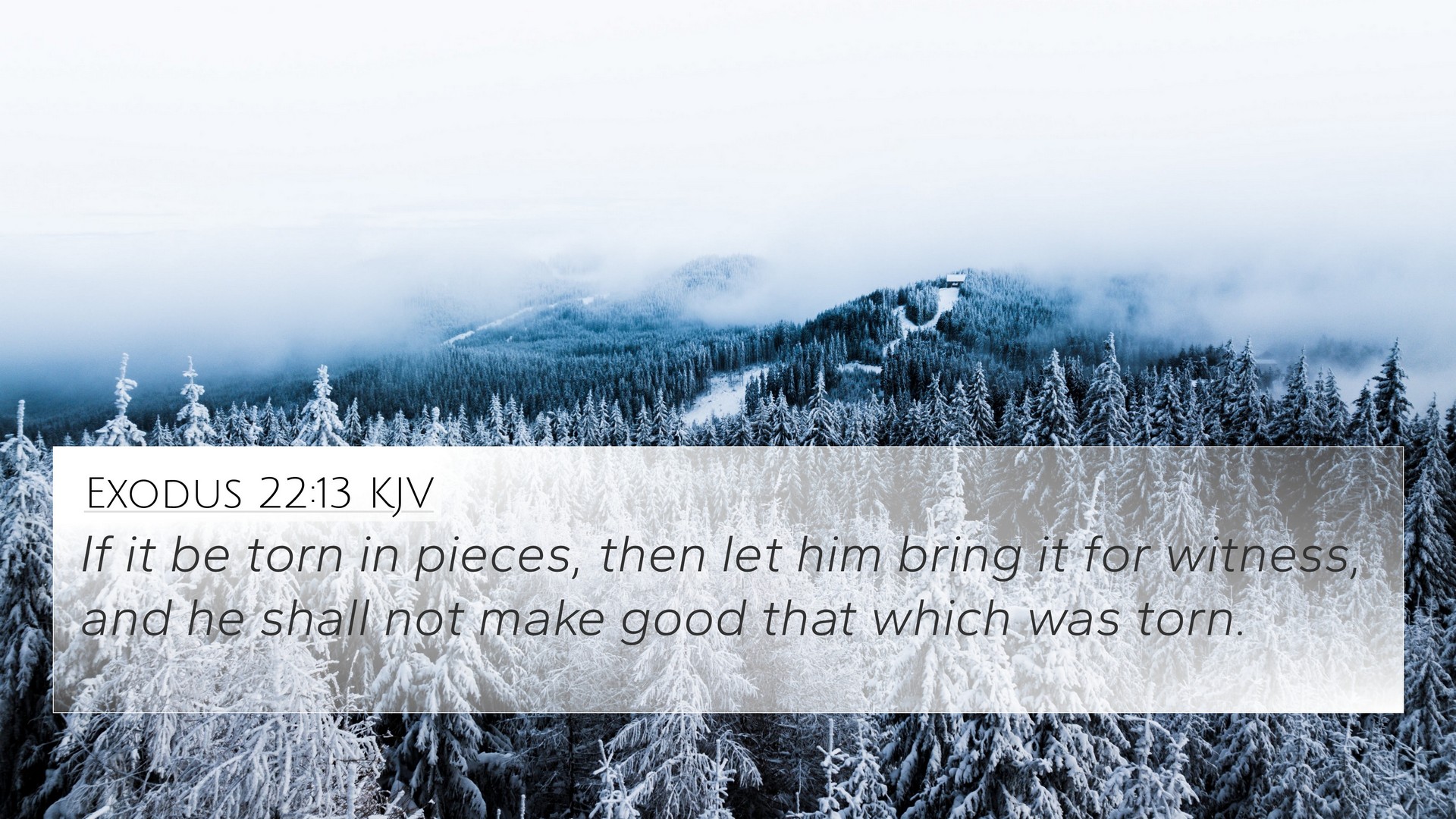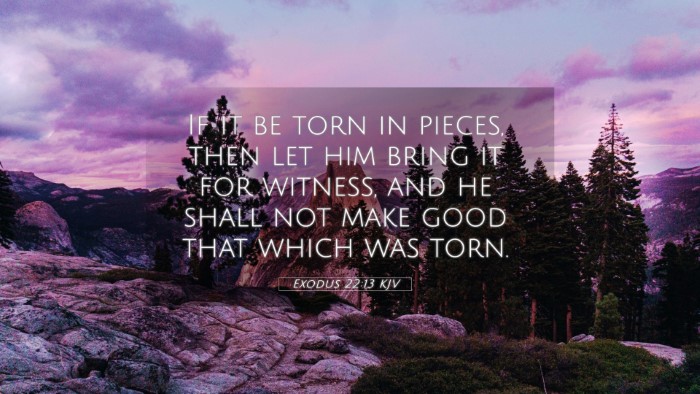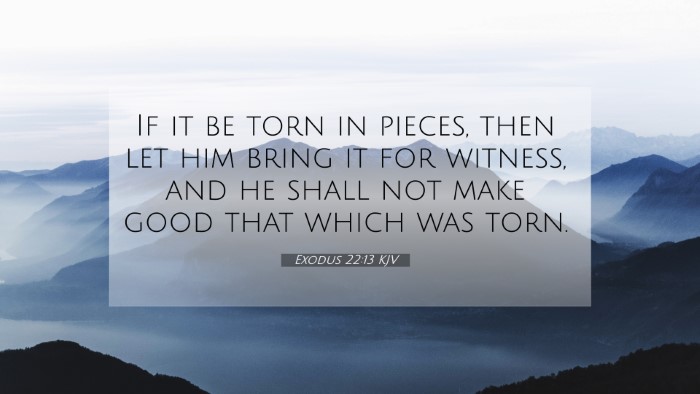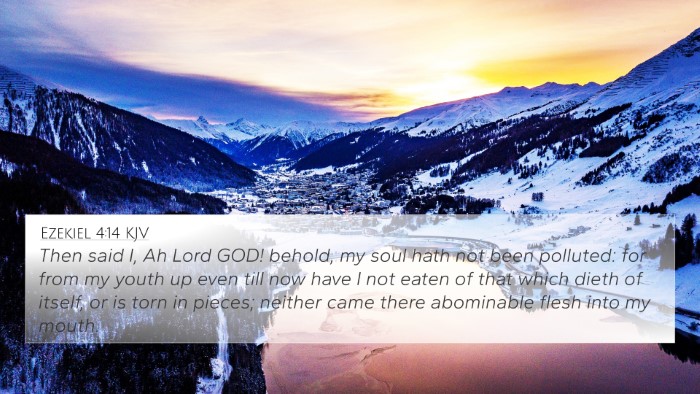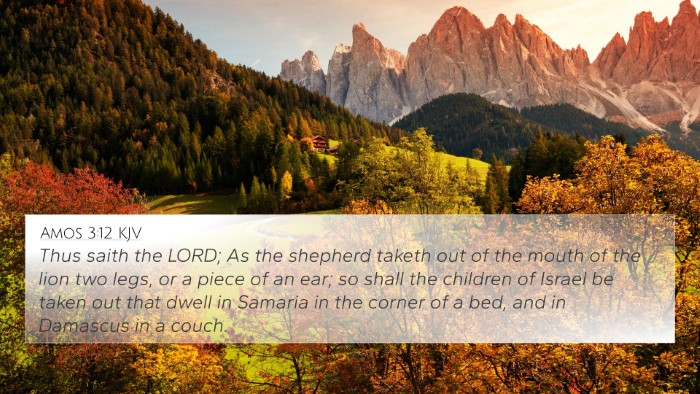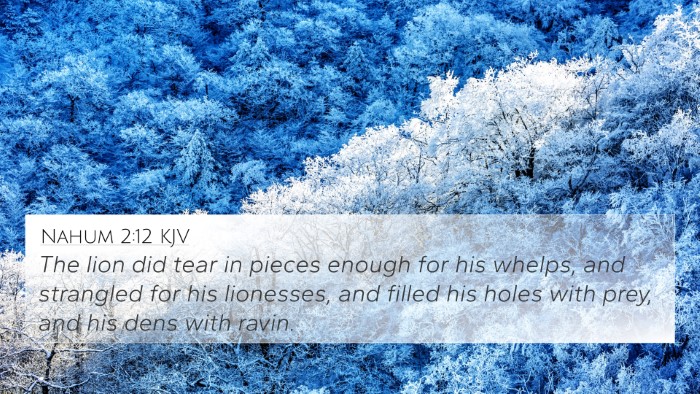Understanding Exodus 22:13
The verse Exodus 22:13 states: "If it be torn in pieces, then let him bring it for witness: and he shall not make good that which was torn." This scripture addresses the issue of restitution in cases where an animal (likely a sheep or goat) has been found dead or injured, implicating possible theft or negligence. The implications of this verse extend into themes of responsibility, honesty, and the attitudes we ought to cultivate towards property and obligations.
Summarized Meaning and Insights
This passage can be effectively understood through insights from notable public domain commentaries. Below are the combined insights derived from Matthew Henry, Albert Barnes, and Adam Clarke:
-
Matthew Henry's Commentary:
Henry elaborates that this law served as a precautionary measure to ensure fairness and accountability. There is importance placed on the concept of proof regarding the condition of the animal, indicating that the responsibility lies on the party claiming loss or injury. This draws connections to principles of justice and the expectation of honest dealings.
-
Albert Barnes' Notes:
Barnes emphasizes the necessity of clear evidence in cases of restitution claims. He suggests that the required action—bringing the torn pieces as proof—shows the gravity of responsibility when it comes to managing another's property or livestock. The verse reflects a broader theme of moral and ethical accountability in community relations.
-
Adam Clarke's Commentary:
Clarke points out that this statute reinforces a system of reciprocal justice, ensuring the protection of property rights. He notes that the underlying principle is that one must account for loss incurred due to negligence, thereby establishing the need for diligence and care in dealings. The focus is also on community welfare and the preservation of trust.
Cross-References and Related Scriptures
Exodus 22:13 closely relates to several other Bible verses, enriching its contextual understanding through thematic links:
- Exodus 22:1: Discusses the value of stolen livestock and restitution.
- Leviticus 6:2-5: Addresses the requirements for making restitution when property is mismanaged or harmed.
- Deuteronomy 22:1-4: Encourages the return of lost property and reinforces accountability.
- Proverbs 27:23-27: Advises careful management and oversight of one's possessions and responsibilities.
- Luke 19:8: Illustrates Zacchaeus’s commitment to restitution, paralleling themes of accountability and redemption.
- 1 Peter 5:2: Encourages careful stewardship of resources, echoing concepts of responsibility derivatively.
- James 5:4: Makes a statement regarding the implications of overlooking a neighbor's needs, reinforcing the social contract of care.
Thematic Connections
This verse is steeped in themes that span across the Old and New Testaments, illustrating profound inter-biblical dialogues:
-
Restitution and Accountability: The ongoing principle of making amends for wrongs done, as seen in both Exodus and the Gospels where righteous restoration is emphasized.
-
Community Trust and Ethics: The vital nature of trust in communal living, resonating with teachings within Proverbs and New Testament exhortations on living righteously.
-
Justice and Fairness: The overarching biblical narrative calls for justice, seen in the laws given to the Israelites and echoed in Jesus’ teachings of fairness and love for one’s neighbor.
Cross-Referencing and Study Techniques
Engaging in bible cross-referencing enhances understanding. Consider using tools such as:
- Bible concordances: For finding specific themes and connections within scripture.
- Bible cross-reference guides: To broaden knowledge on how verses interact and support one another.
- Cross-reference Bible study methods: Allowing deeper engagement with the text through multiple perspective analysis.
Through this comprehensive study and exploration of Exodus 22:13, one gains nuanced insights into principles that govern personal conduct, community responsibility, and divine expectations on how we treat one another’s possessions. The connections drawn highlight how early laws and principles resonate with current moral discussions, providing a timeless framework for understanding justice and accountability in our lives today.
Conclusion
In conclusion, Exodus 22:13 stands as a reminder of the importance of accountability for one's actions regarding property and trust. By integrating various interpretations and cross-references, we can appreciate the rich resources available for understanding scripture's depth and application in contemporary life.
